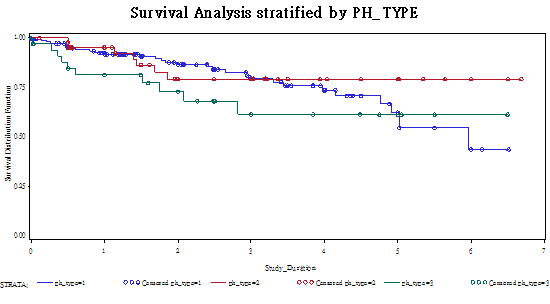Session Information
Session Type: Abstract Submissions (ACR)
Background/Purpose:
Pulmonary hypertension (PH) is a leading cause of death in patients (pts) with Systemic Sclerosis (SSc). The World Health Organization (WHO) classifies PH into groups: pulmonary arterial hypertension (PAH – Group 1); PH secondary to left heart dysfunction or pulmonary venous hypertension (PVH – Group 2); and PH secondary to pulmonary disease (PH-ILD – Group 3). Our objective was to compare the clinical features and survival among the 3 PH groups.
Methods:
Pts in the PHAROS database with PH, defined by a mean PAP³25 mmHg on initial right heart catheterization (RHC), were categorized by WHO criteria. A pulmonary capillary wedge pressure (PCWP)<15 mmHg differentiated Group 1 and 2. Pts with ILD with a forced vital capacity (FVC) <65% predicted or significant fibrosis on chest CT with a normal PCWP were included in group 3. Statistical analysis was carried out using ANOVA, logistic regression, and Kaplan-Meier estimates.
Results:
There are 248 pts with PH in the PHAROS database: PAH – 160, PVH — 49, and PH-ILD Ð39. Demographic and clinical differences are summarized in the table below. PAH pts are slightly older, more likely to be anti-centromere (ACA) positive, and to have limited SSc. Pts with PVH are more likely to be African-American (AA).
Pts have been observed for up to 6.5 yrs. The median period of observation is: PAH 5.02, PVH 1.86, and PH-ILD 2.82 yrs. The 1-year survivals were as follows: PAH 91.8%, PVH 95.2%, and PH-ILD 81.3%, and the 3-year survivals were: PAH 79.4%, PVH 79.1%, and PH-ILD 61.3%. Although the PH-ILD had only a 61% 3 year survival, Kaplan-Meier analysis did not show a significant difference in time to death between the groups, p=0.28, and Cox regression analysis did not show a difference between the groups with respect to survival. Using univariate logistic regression, we assessed the following baseline features as predictors of death: age, gender, race, antibody, disease duration, SSc subtype, RHC parameters, and pericardial effusion. Diffuse subtype was a predictor of death with OR of 1.9 (95% CI 1.008, 3.82), p =0.047. Higher mPAP on RHC was statistically significant with an OR 1.03 (1.005, 1.064) p =0.026. The presence of an effusion missed statistical significance (OR 1.93 (0.977, 3.796), p=0.058).
Conclusion:
Overall survival in the PH patients enrolled in PHAROS is better in this observational cohort than in other recent studies, but WHO Group classification did not affect survival over the present period of observation. How these categorizations affect the prognosis of PH pts will continue to be studied in the long-term follow-up of the PHAROS cohort.
|
Variable |
WHO 1 |
WHO 2 |
WHO 3 |
p-value (overall) |
p-value (1 v 2) |
p-value (1 v3) |
p-value (2 v 3) |
|
Age (years) |
60.4 (10.3) |
54.4 (12.5) |
56.2 (11.7) |
0.027 |
0.0048 |
0.1023 |
0.7489 |
|
% female |
85.2 |
77.3 |
69.4 |
0.0702 |
Overall Insignificant |
||
|
% white % AA |
81.2 11.0 |
59.1 27.2 |
75.0 17.1 |
0.0357 |
0.0428 |
0.268 |
0.1998 |
|
Antibody %aca %scl70 % nuc ANA |
37.6 8.1 22.8 |
13.3 22.2 24.4 |
8.33 30.6 13.9 |
0.0004 |
0.024 |
<0.001 |
0.672 |
|
%limited |
70.5 |
51 |
43.6 |
0.0109 |
0.0418 |
0.0064 |
0.7812 |
|
Disease Duration (yrs) |
10.7 (9.2) |
7.7 (5.5) |
10.2 (8.6) |
0.1134 |
Overall Insignificant |
||
|
Right Heart Catheterization Parameters |
|||||||
|
mPAP |
37.3 (10.5) |
34.4 (9.6) |
33.8 (10.6) |
0.0693 |
Overall Insignificant |
||
|
pulmonary capillary wedge pressure |
10.0 (3.3) |
20.6 (4.1) |
10.0 (4.4) |
<0.001 |
<0.001 |
0.9987 |
<0.001 |
|
cardiac output |
5.0 (1.5) |
5.7 (1.8) |
5.3 (1.8) |
0.0419 |
0.0365 |
0.5566 |
0.5407 |
|
pulmonary vascular resistance |
506.7 (365.6) |
249.7 (183.4) |
338.8 (272.2) |
<0.001 |
<0.001 |
0.1119 |
0.1222 |
|
Pulmonary Function Test Parameters |
|||||||
|
FVC % predicted |
81.8 (16.1) |
66.0 (18.8) |
54.1 (13.9) |
<0.001 |
<0.001 |
<0.001 |
0.0029 |
|
DLCO % predicted |
42.2 (16.9) |
40.0 (17.1) |
28.6 (10.3) |
<0.001 |
0.721 |
<0.001 |
0.0052 |
|
TLC % predicted |
80.5 (16.2) |
70.4 (20.1) |
60.0 (16.1) |
<0.001 |
0.0053 |
<0.001 |
0.0173 |
|
FVC:DLCO ratio |
2.2 (0.9) |
1.8 (0.6) |
2.1 (0.7) |
0.0249 |
0.0193 |
0.6179 |
0.3977 |
Disclosure:
J. K. Gordon,
None;
L. Chung,
Gilead and Actelion,
5,
Gilead, Actelion, Pfizer, United Therapeutics,
2;
R. T. Domsic,
None;
W. T. Huang,
None;
S. L. Lyman,
None;
E. M. Horn,
None;
V. D. Steen,
Gilead,
5;
« Back to 2012 ACR/ARHP Annual Meeting
ACR Meeting Abstracts - https://acrabstracts.org/abstract/world-health-organization-classification-of-pulmonary-hypertension-and-survival-in-systemic-sclerosis-patients-in-the-pharos-cohort/

